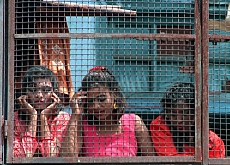Critics slam mild sentence for trafficker

A group fighting the sexual exploitation of women is shocked by a mild sentence given to a brothel owner found guilty of forcing Brazilian women into prostitution.
Women’s campaign group Fiz said the meagre punishment sent out the wrong message as all six members of a trafficking ring walked free from a Zurich court on Wednesday.
The prosecution proved five out of 74 alleged counts of human trafficking, which carries a maximum sentence of 20 years in prison, and 25 counts of living off immoral earnings against the brothel owner.
In its ruling, the court said there was no evidence of a “serious case of human trafficking”.
It said the women had neither been abducted from their homeland nor enticed to Switzerland with false promises.
The state prosecutor, Silvia Steiner, said she would appeal against the lenient sentences, although she was “not dissatisfied” with the court’s assessment.
The prosecution had called for five and a half years for the main accused, but he was sentenced to just 26 months and walked free because he had already spent more than two-thirds of that period in pre-trial detention.
“What do we learn from these ridiculous sentences? That it is not very risky for people to force women into prostitution, and that is a bad signal,” Fiz spokeswomen Doro Winkler told swissinfo.
“It is important that the victims can see that people cannot get away with this, but all the guilty parties left the court in a party mood and were celebrating.”
A total of six people were accused of a variety of offences relating to allegations that the women were forced to work as prostitutes in a Zurich brothel between February 2003 and February 2005.
The other five, four men and a woman, received suspended sentences ranging from one to 18 months after being found guilty of various offences and were also allowed to leave the court.
Increasing problem
The news comes weeks after the publication of a Federal Police Office (Fedpol) report showing an alarming rise in the sex industry in Switzerland last year.
The report also warns that related sex crimes are also on the rise, estimating that there are between 1,500 and 3,000 victims of human trafficking in Switzerland at present.
Police say tougher measures taken at cantonal and federal level in 2005 have led to a rise in the number of cases going to court.
But Fiz has now called on the courts to act tougher to crack down on the scourge of women trafficking.
“As long as the demand exists you cannot stop the sex industry because there is a lot of money to be made there,” Winkler said.
“But if the court sentences were higher then the people living off this trade would look for money in other areas.”
Winkler said that other people in the same trafficking ring found guilty in Brazil had received substantially higher sentences.
“This gives a clear message that it is more risky to carry out this trafficking in Brazil than it is in Switzerland,” she said.
Zurich prosecutors have threatened to charge more people in connection with the case.
swissinfo, Matthew Allen in Zurich
Prostitution generates an annual turnover of SFr3.2 billion ($2.59 billion) a year, according to the Fedpol report.
There are around 14,000 prostitutes working in Switzerland, the report goes on to say.
The number of prostitutes in Zurich rose by 20% between 2003 and 2005. In Geneva there were 50% more sex workers in this period and a new brothel opened up every two weeks in canton Basel.
Prostitution is legal in Switzerland but prostitutes have to register with city authorities and health authorities and get regular health checks.
Pimping is illegal and uncommon: most prostitutes operate independently from small studios via mobile phones. They cannot display their wares.
Human trafficking in persons can carry a prison sentence of up to 20 years and coercing a person into prostitution is punishable with up to ten years in prison.
Besides trafficking for the purpose of sexual exploitation, legislation is being amended to make trafficking to exploit labour and the removal of human organs punishable offences.

In compliance with the JTI standards
More: SWI swissinfo.ch certified by the Journalism Trust Initiative












You can find an overview of ongoing debates with our journalists here . Please join us!
If you want to start a conversation about a topic raised in this article or want to report factual errors, email us at english@swissinfo.ch.